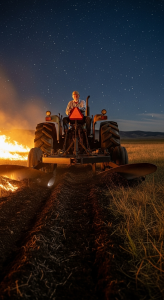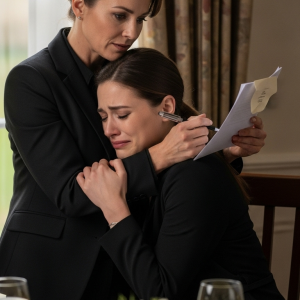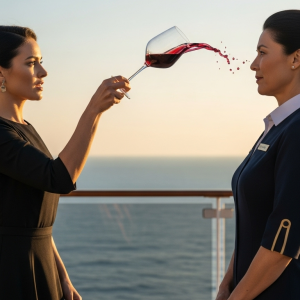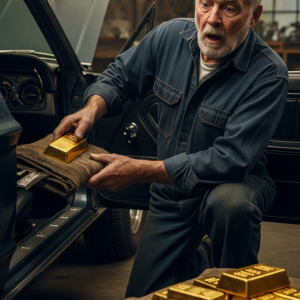The Montana sky was a vast, unforgiving canvas of blue, stretching from one end of the horizon to the other. Down below, the Sterling ranch was a kingdom of dust, sweat, and legacy, carved out of the wilderness by three generations of hands tougher than boot leather. Sam Sterling, the patriarch, was a man cut from the same cloth as the land—weathered, quiet, and possessing a wisdom that didn’t come from books.
His tranquility was shattered by the arrival of the sleek, black German sedan that now looked alien and offensive parked beside his dusty Ford pickup. It brought his daughter, Laura, and her husband, Richard, from their concrete canyon in New York City. Laura, his heart, was caught in a painful orbit between two suns: the father she loved and the husband she thought she knew.
Richard was a man who measured the world in quarterly earnings and stock prices. He wore a suit that cost more than Sam’s first tractor and a smile that never quite reached his eyes. To him, the ranch wasn’t a home; it was an underperforming asset. An opportunity waiting to be liquidated.
“Sam, you have to be realistic,” Richard said during dinner, pushing a piece of steak around his plate. “This land is worth a fortune to developers. We could set up a trust, generate passive income… you’d never have to work another day in your life.”
Sam finished his bite, chewing slowly, his gaze as steady as the mountains on the horizon. “My life’s work isn’t a burden, Richard. It’s a purpose. This dirt holds the sweat of my father, and his father before him. You don’t sell your soul just because someone offers you a good price.”
Laura shifted uncomfortably. “Daddy, Richard’s just thinking of our future. Of your future. He has an opportunity… a once-in-a-lifetime investment. We need capital.”
“There’s always a once-in-a-lifetime opportunity for a man who’s always looking for the next one,” Sam said, his voice flat. The conversation was over.
Later that night, as the house fell into a tense silence, Sam made a call. He stood in his dark office, the silhouettes of his rodeo trophies standing like silent sentinels. “Frank,” he said into the phone, his voice low. “It’s Sam. Yeah, it’s been a while. Listen, I’ve got a coyote sniffing around the henhouse… No, the two-legged kind. I need you to keep an eye on him for me. Name’s Richard Miller. My son-in-law.” There was a long pause. “Just a feeling. And my feelings are usually right.”
Rejection didn’t just bruise Richard’s ego; it fueled his desperation. He saw his escape route closing, the walls of his own making pressing in. If the old man wouldn’t listen to reason, perhaps he’d listen to fear. The ranch was Sam’s heart, so Richard decided to give it a heart attack.
Two nights later, under the cover of a moonless sky, he drove to the far edge of the property. The air was dry, the grass like tinder. He worked clumsily, his hands shaking as he unscrewed the cap of a small gasoline can. He was an investment banker, not an arsonist. The pungent smell filled his nostrils, a perfume of his own reckless panic. He splashed the fuel, struck a match, and watched with a surge of dark satisfaction as the flames greedily consumed the dry grass.
He retreated to a high ridge to watch his plan unfold, expecting to see chaos, sirens, a sprawling panic that would break the old man’s iron will. But he saw none of that.
Sam smelled it before he saw it. A change in the wind, a sharp, acrid scent that didn’t belong. He stepped onto his porch and saw the cattle in the west pasture, normally placid, shifting and lowing with unease. He didn’t need a siren. Decades of living on the land had taught him its language.
“Fire,” he said, his voice calm but carrying an authority that cut through the night. Within minutes, his ranch hands, roused by his call, were in motion. There was no panic, only a quiet, practiced efficiency. Sam was at the wheel of a large tractor, its heavy plow digging into the earth, carving a wide, dark line in the soil—a firebreak.
They worked with the precision of a seasoned military unit, containing the blaze, starving it of fuel. Richard watched from his distant perch, his face a pale mask of disbelief. The fire, his instrument of chaos, was being calmly and expertly dismantled. The small crisis he had engineered was extinguished before it could ever truly begin. He hadn’t broken the old man; he had only revealed how unbreakable he was.
Sam knew. The moment he saw the unnatural speed of the fire, the way it started in a place no lightning would strike, he knew. He didn’t confront Richard. An animal that desperate, when cornered, is unpredictable and dangerous. He would let the coyote think the chickens were unguarded, let him walk right into the trap.
A week later, a thick manila envelope arrived by courier. It had no return address, just his name written in block letters. Sam took it into his office and sat at his heavy oak desk. He read for an hour, his expression hardening with every page he turned. The coyote wasn’t just hungry; he was rabid.
That evening, he called his daughter. His voice was warmer than it had been in weeks. “Laura, honey. I’ve been doing some thinking. Maybe Richard has a point. It’s a lot of work for an old man. Why don’t you two come out for a barbecue this Saturday? We can… discuss the future of the ranch.”
On the other end of the line, Richard’s face lit up with triumphant greed. The old fool had finally cracked. The fire, though a failure in practice, had succeeded in principle. It had planted the seed of fear. “Of course, Sam,” he said, his voice smooth as venom. “We’d be delighted. I’ll bring the paperwork.” He didn’t know he wasn’t coming to a negotiation. He was coming to a reckoning.
Saturday arrived, cloaked in the deceptive warmth of a perfect Montana afternoon. The smell of grilling steaks hung in the air. Richard, feeling victorious, held court by the barbecue, a drink in his hand, explaining his grand vision. He’d brought charts and a glossy prospectus.
“The preliminary zoning indicates we can get approval for a luxury golf resort and residential community,” he announced, gesturing expansively at the rolling hills. “The land is too dangerous, too hard to manage as a ranch. We saw that with the fire. It’s a liability.”
Sam listened, his face an unreadable mask. He let Richard finish, let him lay out his entire fraudulent premise. Laura watched her father, a hopeful, nervous energy about her. She wanted peace. She wanted her two worlds to finally align.
When Richard’s presentation was complete, Sam wiped his mouth with a napkin and stood up. He walked to the picnic table, but he didn’t look at the charts. Instead, he placed the thick manila envelope on the table. It landed with a soft, heavy thud that seemed to silence the entire prairie.
“I think,” Sam said, his voice as calm and flat as the landscape around them, “we should talk about the real reason you want to sell this land, Richard. The real ‘once-in-a-lifetime’ opportunity you’re so interested in.”
Laura, confused, reached for the envelope. “Daddy, what is this?” She opened the clasp and slid out the contents. The top page was a printout of a financial news article. The headline was stark: “SEC DEEPENS INSIDER TRADING PROBE, FOCUSING ON INVESTMENT BANKER RICHARD MILLER.”
Her blood ran cold. She shuffled through the next pages. Bank statements showing massive, leveraged losses. A detailed report on his debts not to banks, but to private lenders with brutal reputations. A summary of his travel inquiries: one-way flights to countries with no extradition treaties with the United States.
She looked up, her face a canvas of utter devastation. She looked at the husband she had defended, the man whose ambition she had admired. Then she looked at her father, whose silence she had mistaken for stubbornness when it was, in fact, wisdom. Her world, the carefully constructed reality of her marriage, shattered in that single, silent moment.
Richard’s confident smile evaporated, replaced by the cornered, feral look of a trapped animal. The mask was gone. Before them stood not a financial wizard, but a desperate, frantic criminal.
“That’s… that’s an invasion of privacy!” he sputtered, his voice cracking. “You have no right!”
“I have every right when you try to burn down my home and sell my family’s legacy to fund your escape,” Sam stated, his voice now like chips of granite. “You put my daughter at risk. You lied to her. You used her. My rights are the only ones that matter here.”
There was nothing left for Richard to say. His lies were exposed, his grand plan reduced to a pile of incriminating paper on a picnic table. The vast, open space of the ranch, which he had seen as a commodity, now felt like an endless prison, offering no place to hide.
Laura stood up slowly, her body trembling. She didn’t scream or cry. Her grief was a quiet, profound thing. She walked past her husband without a glance and stood beside her father. The choice was made. The alignment was complete. She had chosen her home. She had chosen the truth.
Richard was left alone at the table, a ghost at a feast, surrounded by the ruins of his own deceit. The setting sun cast a long shadow, and in it, he looked small, insignificant, and utterly defeated.
Richard was gone before sunrise the next morning. His black sedan sped down the long gravel driveway, kicking up a cloud of dust that soon settled, leaving the air clean again. There were no goodbyes.
The weeks that followed were filled with a quiet pain. Laura’s heart was broken, but for the first time in years, she felt the ground solid beneath her feet. She stayed at the ranch, trading her designer clothes for denim and her city anxieties for the simple, tiring work of the land. She was healing, one fence post, one sunrise at a time.
One evening, as the sun bled orange and purple across the sky, she and Sam rode their horses to the top of a high butte overlooking their kingdom. The world was quiet, peaceful.
“I’m so sorry, Daddy,” she said softly. “I should have seen who he was.”
Sam reached over and placed his rough hand on hers. His eyes weren’t filled with triumph or “I told you so,” only a deep, abiding love. “You’re here now,” he said. “That’s all that matters.” They looked out at the endless expanse of their heritage.
“The land will never lie to you, daughter,” he said, his voice imbued with the certainty of a lifetime of truth. “It gives what you put into it. No more, no less.”
He hadn’t just saved the ranch. He had saved his family. He had brought his daughter home.
The quiet that descended upon the Sterling ranch after Richard’s departure was profound. It wasn’t just the absence of his slick car or his condescending voice; it was the settling of a storm. For the first few days, Laura moved through the familiar rooms of her childhood home like a ghost, the shock having given way to a deep, hollow ache. The life she had built, the man she had loved, had all been a lie, and the weight of that truth was a physical burden.

She knew she couldn’t stay inside, marinating in her grief. The ranch demanded work, a rhythm of life and death that paid no mind to a broken heart. She put on a pair of her father’s old work gloves and followed him out into the relentless sun. Her first tasks were humbling, almost insulting to the woman who once navigated complex social calendars in Manhattan. She mucked out stalls, her designer-accustomed nose wrinkling at the raw, earthy smell. She struggled to lift hay bales, her muscles, softened by years of city life, screaming in protest.
One afternoon, while attempting to mend a stretch of barbed-wire fence, she grew frustrated. The wire was stiff, her hands were clumsy, and she snagged her shirt, tearing the fabric. Tears of anger and futility welled in her eyes. It was a small thing, a torn shirt, but it felt like the final indignity. She wasn’t a rancher’s daughter anymore; she was a failure, a fool who had been tricked, now playing dress-up in a world she no longer belonged to.
Sam, who had been working nearby, walked over. He didn’t say a word. He simply took the pliers from her trembling hands and, with a few deft, practiced movements, twisted the wire, securing it tightly to the post. He then looked at her, his gaze gentle.
“The wire doesn’t care how you feel about it,” he said, his voice a low rumble. “It just needs to be fixed. You pull, it pulls back. You just have to find the right leverage. Find the spot where it gives.” He handed the pliers back to her. It wasn’t just about the fence, and they both knew it.
That evening, they sat in the kitchen, the scent of coffee hanging in the air. Laura finally spoke the words that had been haunting her. “I feel so stupid, Dad. How could I not see it? All the signs must have been there. I defended him to you. I chose him over… this.” She gestured around the warm, rustic kitchen, a symbol of the home she had so eagerly left behind.
Sam took a slow sip of his coffee. “You didn’t choose him over this, Laura. You chose the life you thought you wanted. There’s no shame in that. He was good at selling a dream. That’s what men like him do. They find good people and sell them a beautiful, empty box.” He paused, his gaze fixed on a point out the dark window.
“I knew something was wrong from the start,” he admitted. “Not because I’m smarter. But because the land teaches you to spot things that don’t belong. A sick calf in a healthy herd. A coyote that’s gotten too bold. He had the same look in his eyes. Hungry, but also scared. A predator who knows he’s being hunted himself.”
The conversation was a turning point. It wasn’t absolution, but it was understanding. It reframed her experience not as a personal failing, but as a lesson in survival, a lesson her father had been trying to teach her all along.
A week later, the phone rang. It was Frank, the private investigator. Sam listened for a few minutes, his only replies being a series of grunts. He hung up and turned to Laura, who was watching him anxiously.
“They caught him,” Sam said, his voice devoid of emotion. “Tried to cross the border into Canada with a bag full of cash and a fake passport. The news will probably break tomorrow. The SEC is freezing everything. The people he owed money to… well, they can’t get to him in federal custody.”
A wave of relief so profound it almost buckled Laura’s knees washed over her. It was over. The final thread connecting her to that life had been severed. The danger, both legal and otherwise, was contained. Richard was no longer her problem; he was a headline, a cautionary tale.
With that news, something inside Laura settled. Her work on the ranch changed. It was no longer a penance or a distraction. It became a purpose. She learned to anticipate the needs of the animals, to read the sky for signs of changing weather. She rose with the sun, the fatigue in her muscles a welcome, honest ache. She was finding the leverage, the spot where the stubborn wire of her own life began to give.
Months passed. The searing heat of summer gave way to the crisp, golden light of autumn. The leaves on the cottonwood trees along the creek turned a brilliant yellow. One cool evening, she and Sam once again rode to the top of the butte. The view was the same, but she was different.
She sat tall in her saddle, her hands confident on the reins. The land no longer felt like a foreign country, but an extension of herself. She was no longer Richard’s broken wife, hiding at her father’s ranch. She was Laura Sterling. And she was home.
“Do you ever miss it?” Sam asked, his voice carried on the wind. “The city? The noise?”
Laura looked out at the vast, silent kingdom that was her birthright, her sanctuary, her future. A genuine smile, the first in a long time, touched her lips.
“Sometimes I miss the food,” she admitted with a small laugh. “But I’ve learned that you can’t eat a dream, Dad. No matter how beautiful the box it comes in.” The peace she felt was real, earned, and as solid as the mountains that stood guard on the horizon.




